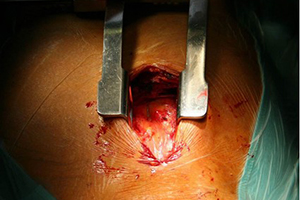Minimally invasive aortic valve replacement: the Leipzig experience
Abstract
Background: Minimally invasive techniques are progressively challenging traditional approaches in cardiothoracic surgery. Minimally invasive aortic valve replacement (AVR) has become a routine procedure at our institution.
Methods: We retrospectively analyzed all patients undergoing minimally invasive isolated AVR between January 2003 and March 2014, at our institution. Mean follow-up was 4.7±4.3 years (range: 0-18 years) and was 99.8% complete.
Results: There were 1,714 patients who received an isolated minimally invasive AVR. The mean (± SD) patient age was 65±12.8 years, ejection fraction 60%±12% and log EuroSCORE 5.3%±5.1%. Mean cross-clamp time was 58±18 minutes and mean cardiopulmonary bypass (CPB) time was 82.9±26.7 minutes. Thirty-day survival was 97.8%±0.4%, and 69.4%±1.7% at 10-years. The multivariate analysis revealed age at surgery [P=0.016; odds ratio (OR), 1.1], length of surgery time (P=0.002; OR, 1.01), female gender (P=0.023; OR, 3.54), preoperative myocardial infarction (MI) (P=0.006; OR, 7.87), preoperative stroke (P=0.001; OR, 13.76) and preoperative liver failure (P=0.015; OR, 10.28) as independent risk factors for mortality. Cox-regression analysis revealed the following predictors for long term mortality: age over 75 years (P<0.001; OR, 3.5), preoperative dialysis (P<0.01; OR, 2.14), ejection fraction less than 30% (P=0.003; OR, 3.28) and urgent or emergency operation (P<0.001; OR, 2.3).
Conclusions: Minimally invasive AVR can be performed safely and effectively with very few perioperative complications. The early and long-term outcomes in these patients are acceptable.
Cover






